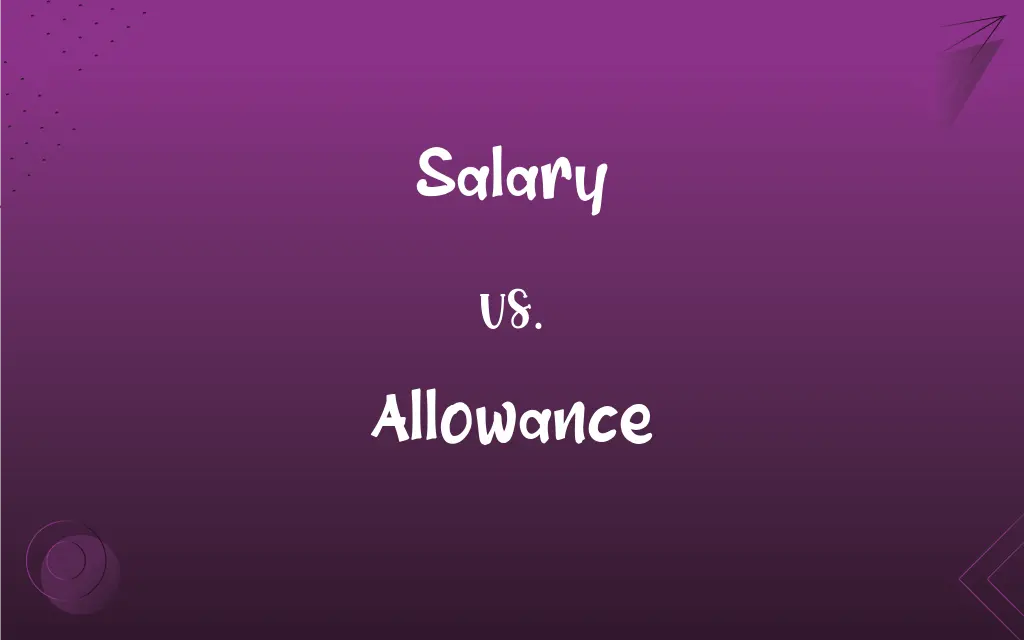Salary vs. Allowance: What's the Difference?
Edited by Aimie Carlson || By Harlon Moss || Updated on November 6, 2023
Salary is a fixed regular payment for employment, while allowance is an amount of money given regularly for a specific purpose.

Key Differences
A salary is a fixed payment made regularly, typically monthly or biweekly, to an employee by an employer. It is often expressed as an annual sum but distributed in parts over the year. Allowance, on the contrary, refers to a specific amount of money given regularly, often for a particular purpose or to cover certain expenses.
Salaries are understood to be compensation for the work done in a job, reflecting the value of one's role and responsibilities. Allowances are often supplementary, intended to cover expenses that individuals may incur, such as travel, food, or housing. While salary is taxable income, some allowances can be tax-exempt, depending on their nature and local tax laws.
Salary is associated with one's profession and is subject to negotiation and increments based on performance and tenure. Allowances, however, are typically predetermined amounts set by the employer or policy and may not necessarily increase with tenure or performance but rather with inflation or policy changes.
In terms of financial stability, a salary is a primary source of income and is expected to meet most of an individual's or family's financial needs. Allowances are typically not intended to be a primary source of income but rather to mitigate specific costs, and are often received in addition to a salary.
The structure of salary is more rigid, coming with obligations such as fixed working hours and job descriptions. Allowances tend to be more flexible, provided to cover costs as they arise, and they may vary based on actual expenditures, such as in the case of a per diem for travel.
ADVERTISEMENT
Comparison Chart
Definition
Fixed regular payment for employment.
Money given regularly for a specific purpose.
Purpose
To compensate for professional work.
To cover particular expenses or needs.
Variability
Typically fixed and changes with promotions or raises.
May vary based on expense needs or company policy.
Tax Implications
Usually taxable as income.
Can be tax-exempt if used for its intended purpose.
Dependence
Reflective of job position and responsibilities.
Often dependent on company policy or specific expense nature.
ADVERTISEMENT
Salary and Allowance Definitions
Salary
Regular payment for employment.
She negotiated her salary to reflect her advanced skills.
Allowance
Money given for a specific purpose.
Her travel allowance covers all business-related expenses.
Salary
Annual compensation divided over payment periods.
His salary is paid biweekly, providing a steady income stream.
Allowance
Fixed sum for expenses.
The children get a weekly allowance for their chores.
Salary
Periodic employment income.
His salary is directly deposited into his bank account each month.
Allowance
Supplement to income for costs.
The job includes a generous housing allowance.
Salary
Guaranteed earnings from a job.
Her salary increased after the annual performance review.
Allowance
Periodic payment for particular needs.
She set aside part of her allowance for textbooks.
Salary
Fixed monetary remuneration for work.
The salary for that position is competitive within the industry.
Allowance
Regular amount provided on top of salary.
He receives a monthly car allowance from his company.
Salary
Fixed compensation for services, paid to a person on a regular basis.
Allowance
The act of allowing.
Salary
A fixed amount of money paid to a worker, usually calculated on a monthly or annual basis, not hourly, as wages. Implies a degree of professionalism and/or autonomy.
Allowance
An amount that is allowed or granted
Consumed my weekly allowance of two eggs.
FAQs
Can salary vary from month to month?
Typically, a salary is a fixed amount unless there's overtime or bonuses involved.
What constitutes a salary?
A salary is a fixed regular payment given for employment.
Do salaries come with benefits?
Often, salaries are accompanied by benefits like health insurance or retirement plans.
Is a high salary indicative of a good job?
Not always, other factors like work-life balance and job satisfaction are also important.
Do part-time jobs offer salaries?
Part-time jobs may offer salaries, but often they are paid hourly.
Are allowances taxed?
Some allowances are tax-exempt, but it depends on the nature of the allowance and tax laws.
Can you negotiate allowances?
Sometimes, especially if they're for relocation or unique job-related expenses.
Are allowances considered part of a salary?
No, allowances are separate payments intended for specific expenses.
Is a housing allowance common?
Yes, especially for jobs requiring relocation or in high-cost living areas.
Is an allowance always in cash?
Allowances can be in cash or reimbursements for expenses.
Are salaries confidential?
This varies by company policy, but many choose to keep them confidential.
Does a higher salary mean more taxes?
Generally, yes, since tax rates often progress with higher income.
Are allowances part of gross income?
They can be, but some parts may be exempt from tax if spent appropriately.
How is salary determined?
Salary is typically determined by role, experience, industry standards, and negotiation.
What’s the difference between a salary and wages?
Salary is a fixed annual amount, while wages are hourly or daily payments for work done.
Can allowances be for personal use?
Yes, but they're typically for job-related expenses.
What happens to my salary if I'm on leave?
Policies vary, but salaries often continue; however, specific allowances might stop.
What's a per diem allowance?
It's a daily allowance given to employees to cover daily expenses while traveling.
How can I maximize my allowance benefits?
By understanding tax laws and company policies, you can use allowances more effectively.
Is bonus part of the salary?
No, bonuses are usually separate and may be tied to performance or company profit.
About Author
Written by
Harlon MossHarlon is a seasoned quality moderator and accomplished content writer for Difference Wiki. An alumnus of the prestigious University of California, he earned his degree in Computer Science. Leveraging his academic background, Harlon brings a meticulous and informed perspective to his work, ensuring content accuracy and excellence.
Edited by
Aimie CarlsonAimie Carlson, holding a master's degree in English literature, is a fervent English language enthusiast. She lends her writing talents to Difference Wiki, a prominent website that specializes in comparisons, offering readers insightful analyses that both captivate and inform.
































































